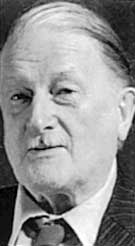Ronald Syme
|
Sir Ronald Syme OM FBA |
|
|---|---|
 |
|
| Born |
11 March 1903 Eltham, New Zealand |
| Died | 4 September 1989 (aged 86) Oxford, England |
| Nationality | New Zealand |
| Occupation | Ancient historian |
| Known for | Roman history; The Roman Revolution (1939) |
Sir Ronald Syme, OM, FBA (11 March 1903 – 4 September 1989) was a New Zealand-born historian and classicist. Long associated with Oxford University, he is widely regarded as the 20th century's greatest historian of ancient Rome. His great work was The Roman Revolution (1939), a masterly and controversial analysis of Roman political life in the period following the assassination of Julius Caesar.
Syme was born to David and Florence Syme in Eltham, New Zealand, where he attended primary and secondary school; a bad case of measles seriously damaged his vision during this period. He moved to New Plymouth Boys' High School (a house of which bears his name today) at the age of 15, and was head of his class for both of his two years. He continued to the University of Auckland and Victoria University of Wellington, where he studied French language and literature while working on his degree in Classics. He was then educated at Oriel College, Oxford between 1925 and 1927, gaining First Class honors in Literae Humaniores (ancient history and philosophy). In 1926, he won the Gaisford Prize for Greek Prose for translating a section of Thomas More's Utopia into Platonic prose, and the following year won the Prize again (for Verse) for a translation of part of William Morris's Sigurd the Volsung into Homeric hexameters.
...
Wikipedia
